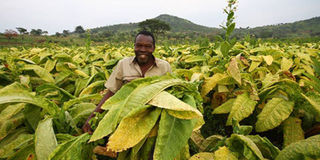Farmers to lose Shs3b as BAT suspends operations in Kigezi

A farmer shows off his tobacco harvest. More than 700 farmers will be affected after British American Tobacco Uganda suspended operations in North Kigezi area. COURTESY PHOTO
What you need to know:
Factor. Decision was driven by higher costs of production.
Kanungu.
More than 709 farming households will be without a steady household income worth about Shs2.7 billion after British American Tobacco Uganda (Batu) announced that they are suspending tobacco growing operations in North Kigezi Area.
In a March 21 letter addressed to the Resident District Commissioner Kanungu and copied to the district tobacco inspector and Chief Africulture Officer, Batu managing director Jonathan D’Souza said the decision was mainly driven by higher costs of production.
“Due to higher costs of production, tobacco growing has become increasingly less economically viable. This is primarily driven by the increasing cost of wood fuel,” said Mr D’Souza.
“We would normally start contacting farmers in the area during May, however due to the economics of this operation, compounded by uncertainty around the sector..., we regret to inform you that we will not be contracting farmers in Kihihi for the 2014/15 season,” he added.
He said the higher costs of production have been worsened by the proposed imposition of a tax of $0.5 per kg on tobacco leaf exports which would render the Batu tobacco export business unprofitable as this would render Ugandan tobacco uncompetitive on the world market.
He also said the Tobacco (Control & Marketing) Act as proposed in the Tobacco Control Bill 2014, would “leave us and our investment exposed to the unscrupulous behaviour of unethical competitors.”
In the just concluded 2013/14 season, Batu alone sponsored 709 farmers with more than Shs786 million in loans to produce 728,000kg of tobacco from which they earned a total of Shs2.7 billion.
Export earnings
In 2013, export earnings from tobacco, made up 4 per cent of the total export revenue ($2.9 billion) and at US$115.3 million in export revenues, the crop in 2013 also became Uganda’s 4th biggest export revenue earner, behind coffee ($425.4 million), minerals ($138 million) and oil re-exports ($137.8 million).




